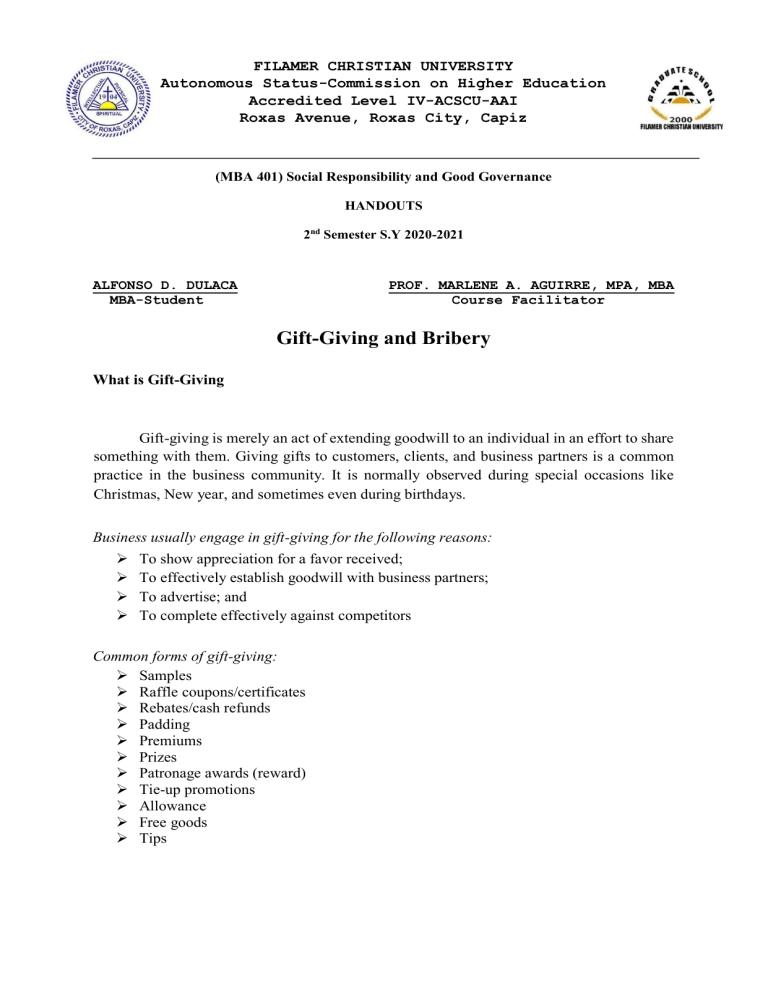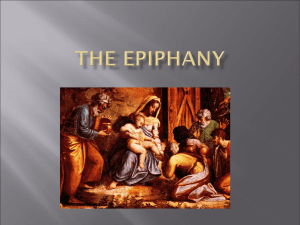
FILAMER CHRISTIAN UNIVERSITY Autonomous Status-Commission on Higher Education Accredited Level IV-ACSCU-AAI Roxas Avenue, Roxas City, Capiz (MBA 401) Social Responsibility and Good Governance HANDOUTS 2nd Semester S.Y 2020-2021 ALFONSO D. DULACA MBA-Student PROF. MARLENE A. AGUIRRE, MPA, MBA Course Facilitator Gift-Giving and Bribery What is Gift-Giving Gift-giving is merely an act of extending goodwill to an individual in an effort to share something with them. Giving gifts to customers, clients, and business partners is a common practice in the business community. It is normally observed during special occasions like Christmas, New year, and sometimes even during birthdays. Business usually engage in gift-giving for the following reasons: ➢ ➢ ➢ ➢ To show appreciation for a favor received; To effectively establish goodwill with business partners; To advertise; and To complete effectively against competitors Common forms of gift-giving: ➢ Samples ➢ Raffle coupons/certificates ➢ Rebates/cash refunds ➢ Padding ➢ Premiums ➢ Prizes ➢ Patronage awards (reward) ➢ Tie-up promotions ➢ Allowance ➢ Free goods ➢ Tips Is Gift-Giving Ethical or Unethical? Business gifts of clients and business associates can raise conflict-of-Interest problems, and knowing where to draw the line, between what is right and wrong, is not easy. Examples: • Linda, a former client, has steered a half dozen prospective clients your way this year, and several of them have become valued clients of your firm. Would it be an appropriate gesture, to thank her by inviting her and her husband out for a dinner? • Jose, your former classmate in law school (now an established lawyer practitioner), has referred a case that just resulted in a significant settlement. Would there be anything wrong with sending him a pair of concert tickets as a “thank you” gesture? It is indeed difficult to determine the morality of giving gifts. Certainly not all examples of giving and accepting gifts and amentias qualify as bribery, just as not all cases of taking another’s property should be considered theft. Factors in Determining the morality of Gift-Giving 1. Value of the Gift – the term “nominal and “substantial” in this point of view is relative. It varies on beliefs and culture of a particular group of people and society. 2. Purpose of the Gift – as long as the gift is not intended or received as a bribe and remains nominal, there doesn’t appear to be to be any serious problem. 3. Circumstances under which the Gift was given or received – a gift given during holiday season, for a store opening, or one attached to a special event is circumstantially different from one unattached to any special event or occasion. 4. Position between or Relationship of the giver and receiver – In a superior and subordinate relationship, for instance, the donors or the recipients have to make it clear that they don’t intend to allow the gift to influence their actions and decisions. 5. Acceptable Business Practice in the Industry – Monetary gifts and tips are usually 6. practiced in numerous service industries. When gratuities are an integral part of customary business practice, they are far less prone to pose moral questions. 7. Company Policy – If firms explicitly forbid the practice of giving and receiving gifts to its customers, vendors or suppliers, associates, or corporate directors, then gift-giving would normally wrong. 8. Laws and Regulations – Certain federal, state or local government institutions may impose laws that forbid accepting gifts from firms with which they do business. When these gift transactions violate the law, they are clearly unacceptable. What is Bribery Bribery is defined as a practice of giving renumeration for performance of an act that is inconsistent with the work contract or the nature of the work one has been hired to perform. It is intended to induce people inside the business or other organization to make decisions that would not be justifiable according to normal business or other criteria. It was then identified to be a form of corruption and is generally immoral and for most is illegal. Renumerations, teemed as bribes, can be in the form of money, gifts, entertainment, or preferential treatment. Examples: ➢ A motorist offers a certain amount of money to a police officer in order not to be issued a ticket for over speeding; ➢ A citizen seeking paperwork or utility line connections gives an expensive gift to a functionary in exchange for a faster service; ➢ A construction company sharing percentage of its income to a civil servant in order to win a contract and; ➢ A narcotics smuggler bribes a judge to lessen criminal penalties In some cases, the briber holds a powerful role and controls the transaction; in other cases, a bribe may be effectively extracted from the person paying it. Bribery is unethical because of the following reasons: ➢ It is generally as an instrument to gain personal or compose advantage; ➢ It corrupts the concept of justice and equally; ➢ Bribery produces cynicism and a general distrust of institutions ➢ It destroys people’s tit tourist in the integrity of professional services, of government and the courts, of law enforcement, religion, and anything it touches; and ➢ It treats people as commodities whose honor can be bought and sold. It thus tends to degrade the respect we owe to other human beings. REPUBLIC ACT NO. 3019 ANTI-GRAFT AND CORRUPT PRACTICES ACT SECTION 2 "Receiving any gift" includes the act of accepting directly or indirectly a gift from a person other than a member of the public officer's immediate family, in behalf of himself or of any member of his family or relative within the fourth civil degree, either by consanguinity or affinity, even on the occasion of a family celebration or national festivity like Christmas, if the value of the gift is under the circumstances manifestly excessive. Sec. 8. Dismissal due to unexplained wealth. Sec. 9. Penalties for violations. (Imprisonment for not less than one year nor more than ten years, perpetual disqualification from public office, and confiscation or forfeiture in favor of the Government of any prohibited interest and unexplained wealth manifestly out of proportion to his salary and other lawful income.) Sec. 12. Termination of office. This Act or under the provisions of the Revised Penal Code on bribery. Sec. 13. Suspension and loss of benefits. THANK YOU & GOD BLESS!


